
Mamluk is a term most commonly referring either to slave soldiers, freed slaves, Muslim converts assigned to military and administrative duties, and Muslim rulers of slave origin.

The history of Egypt under the Muhammad Ali dynasty (1805–1953) spanned the later period of Ottoman Egypt, the Khedivate of Egypt under British patronage, and the nominally independent Sultanate of Egypt and Kingdom of Egypt, ending with the Revolution of 1952 and the formation of the Republic of Egypt.
1798 was a relatively quiet period in the French Revolutionary Wars. The major continental powers in the First coalition had made peace with France, leaving France dominant in Europe with only a slow naval war with Great Britain to worry about. The leaders of the Directory in Paris feared Napoleon Bonaparte's popularity after his victories in Italy, so they were relieved when he proposed to depart France and mount an expedition to Egypt to gain further glory.
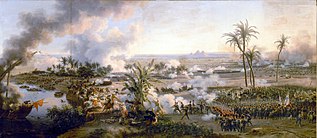
The Battle of the Pyramids, also known as the Battle of Embabeh, was a major engagement fought on 21 July 1798 during the French Invasion of Egypt. The French army, under Napoleon Bonaparte, scored a decisive victory against the forces of the local Mamluk rulers, wiping out almost the entire Ottoman army located in Egypt. It was the battle where Napoleon employed one of his significant contributions to military tactics, the divisional square. Actually a rectangle, the deployment of the French brigades into these massive formations repeatedly threw back multiple cavalry charges by the Mamluks.

The Burji or Circassian Mamluk dynasty ruled Egypt from 1382 until 1517, during the Mamluk Sultanate. It proved especially turbulent, with short-lived sultans. Political power-plays often became important in designating a new sultan. During this time Mamluks fought Timur and conquered Cyprus. Constant bickering may have contributed to the ability of the Ottomans to challenge them. Their name means 'of the tower', referring to them ruling from the Citadel east of Cairo.
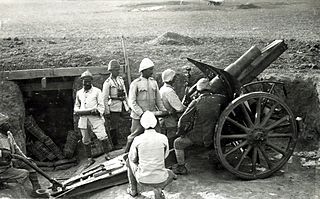
The Sinai and Palestine campaign of the Middle Eastern theatre of World War I was fought by the Arab Revolt and the British Empire, against the Ottoman Empire and its Imperial German allies. It started with an Ottoman attempt at raiding the Suez Canal in 1915, and ended with the Armistice of Mudros in 1918, leading to the cession of Ottoman Syria.

The Battle of Abukir was a battle in which Napoleon Bonaparte defeated Seid Mustafa Pasha's Ottoman army on July 25, 1799, during the French campaign in Egypt. It is considered the first pitched battle with this name, as there already was a naval battle on August 1, 1798. No sooner had the French forces returned from a campaign to Syria, than the Ottoman forces were transported to Egypt by Sidney Smith's British fleet to put an end to French rule in Egypt.

The Eyalet of Egypt operated as an administrative division of the Ottoman Empire from 1517 to 1867. It originated as a result of the conquest of Mamluk Egypt by the Ottomans in 1517, following the Ottoman–Mamluk War (1516–1517) and the absorption of Syria into the Empire in 1516. The Ottomans administered Egypt as an eyalet of the their Empire from 1517 until 1867, with an interruption during the French occupation of 1798 to 1801.
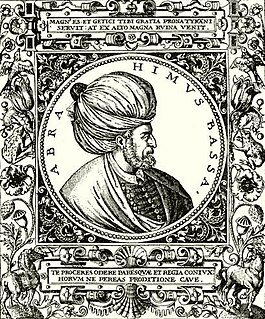
Pargalı Ibrahim Pasha, also known as Frenk Ibrahim Pasha, Makbul Ibrahim Pasha, which later changed to Maktul Ibrahim Pasha after his execution in the Topkapı Palace, was the first Grand Vizier of the Ottoman Empire appointed by Sultan Suleiman the Magnificent.

The Alexandria expedition of 1807 or Fraser expedition was an operation by the Royal Navy and the British Army during the Anglo-Turkish War (1807–1809) of the Napoleonic Wars to capture Alexandria in Egypt with the purpose of securing a base of operations against the Ottoman Empire in the Mediterranean Sea. It was a part of a larger strategy against the Ottoman-French alliance of the Ottoman Sultan Selim III. It resulted in the occupation of Alexandria from 18 March to 25 September 1807. The people of Alexandria, being disaffected towards Muhammad Ali, opened the gates of the city to the British forces, allowing for one of the easiest conquests of a city by the British forces during the Napoleonic Wars. Attempts to proceed inland however, were to prove disastrous with British troops being twice defeated in battles at Rosetta, at a cost of over 900 officers and men killed and more than 500 captured. Consequently British troops were forced to retreat to Alexandria, where they remained besieged. After further inconclusive operations against the Egyptian forces and being unable to gather supplies, the Expedition was forced to embark the transports again, and leave Alexandria, not having gained any significant position of influence in Egypt or reached any specific goals towards influencing the Ottoman Empire's improving relations with France.
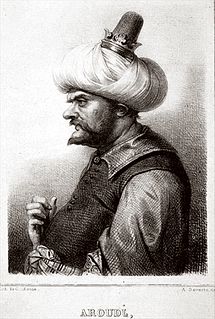
Oruç Reis was an Ottoman seaman of Greek-Albanian origin, who became bey (governor) of Algiers, beylerbey of the West Mediterranean, and admiral of the Ottoman Empire. The elder brother of the famous Greek-Albanian Ottoman admiral Hayreddin Barbarossa, he was born on the Ottoman island of Midilli and died in battle against the Spanish at Tlemcen in the Ottoman Eyalet of Algeria.

Koca Hüsrev Mehmed Pasha was an Ottoman admiral, reformer and statesman, who was Kapudan Pasha of the Ottoman Navy. He reached the position of Grand Vizier rather late in his career, between 2 July 1839 and 8 June 1840 during the reign of Abdulmejid I. However, during the 1820s, he occupied key administrative roles in the fight against regional warlords, the reformation of the army, and the reformation of Turkish attire. He was one of the main statesmen who predicted a war with the Russian Empire, which would eventually be the case with the outbreak of the Crimean War.

The French campaign in Egypt and Syria (1798–1801) was Napoleon Bonaparte's campaign in the Ottoman territories of Egypt and Syria, proclaimed to defend French trade interests, seek further direct alliances with Tipu Sultan, weaken Britain's access to India, and to establish scientific enterprise in the region. It was the primary purpose of the Mediterranean campaign of 1798, a series of naval engagements that included the capture of Malta. The campaign ended in defeat for Napoleon, and the withdrawal of French troops from the region.
The First Egyptian–Ottoman War, First Turco-Egyptian War or First Syrian War (1831–1833) was a military conflict between the Ottoman Empire and Egypt brought about by Muhammad Ali Pasha's demand to the Sublime Porte for control of Greater Syria, as reward for aiding the Sultan during the Greek War of Independence. As a result, Muhammad Ali's forces temporarily gained control of Syria, advancing as far north as Kütahya.
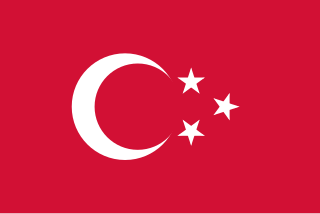
The Khedivate of Egypt was an autonomous tributary state of the Ottoman Empire, established and ruled by the Muhammad Ali Dynasty following the defeat and expulsion of Napoleon Bonaparte's forces which brought an end to the short-lived French occupation of Lower Egypt. The Khedivate of Egypt had also expanded to control present-day Sudan, South Sudan, Israel, Lebanon, Jordan, Syria, southern Turkey, and northwestern Saudi Arabia.
The Convention of London of 1840 was a treaty with the title of Convention for the Pacification of the Levant, signed on 15 July 1840 between the Great Powers of United Kingdom, Austria, Prussia, Russia on one hand and the Ottoman Empire on the other. The Convention lent some support to the Ottoman Empire, which was having difficulties with its Egyptian possessions.

The Ottoman–Mamluk War of 1516–1517 was the second major conflict between the Egypt-based Mamluk Sultanate and the Ottoman Empire, which led to the fall of the Mamluk Sultanate and the incorporation of the Levant, Egypt, and the Hejaz as provinces of the Ottoman Empire. The war transformed the Ottoman Empire from a realm at the margins of the Islamic world, mainly located in Anatolia and the Balkans, to a huge empire encompassing much of the traditional lands of Islam, including the cities of Mecca, Cairo, Damascus, and Aleppo. Despite this expansion, the seat of the empire's political power remained in Constantinople.
The Capture of Cairo refers to the capture of the capital of the Mamluk Sultanate in Egypt by the Ottoman Empire in 1517.

The Siege of Cairo also known as the Cairo Campaign was a siege that took place during the French Revolutionary Wars, between French and British with Ottoman forces and was the penultimate action of the Egyptian Campaign. British commander John Hely-Hutchinson advanced to Cairo, where he arrived after a few skirmishes in mid June. Joined by a sizeable Ottoman force Hutchinson invested Cairo and on 27 June the surrounded 13,000-strong French garrison under General Augustin Daniel Belliard, out-manned and out-gunned then surrendered. The remaining French troops in Egypt under Jacques-François Menou disheartened by this failure, retired to Alexandria.
The Campaign for Adana occurred after Ottoman forces seized the city of Adana from the Mamluk Sultanate. The Mamluks would respond by sending a force under Commander and Chief Uzbek. The Mamluks would besiege Adana. The Ottomans responded by sending a large relief force that was defeated.














